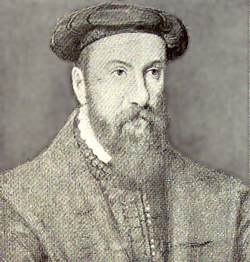"Inkhorn" terms: Sir John Cheke
Sir John Cheke (1514-1557) was opposed to what another humanist of the time, Roger Ascham, called "inkhorn terms"--words coined from Latin or Greek to make English sound more dignified (the modern equivalent is jargon). Cheke also had strong ideas on the way to make English spelling logical.
Cheke writes:
I am of this opinion that our own tung should be written cleane and pure, unmixt and unmangeled with borowing of other tunges; wherein if we take not heed by tiim, ever borowing and never paying, she shall be fain to keep her house as bankrupt.
For then doth our tung naturallie and praisablie utter her meaning when she boroweth no counterfeitness of other tunges to attire herself withall, but useth plainlie her own, with such shift as nature, craft, experiens and following of other excellent [writers] doth lead her unto... This I say not for reproof of you. . . but for miin own defense, who might be counted overstraight [too strictly] a deemer of things [prescriptive], if I gave not thys accoumpt to you, my freend and wiis, of mi marring this your handiwork.
The passage is from a letter written to his friend, Sir Thomas Hoby (who used it as a preface to The Courtier). It is published in the Everyman edition of The Courtier (London: Dent, 1928).
